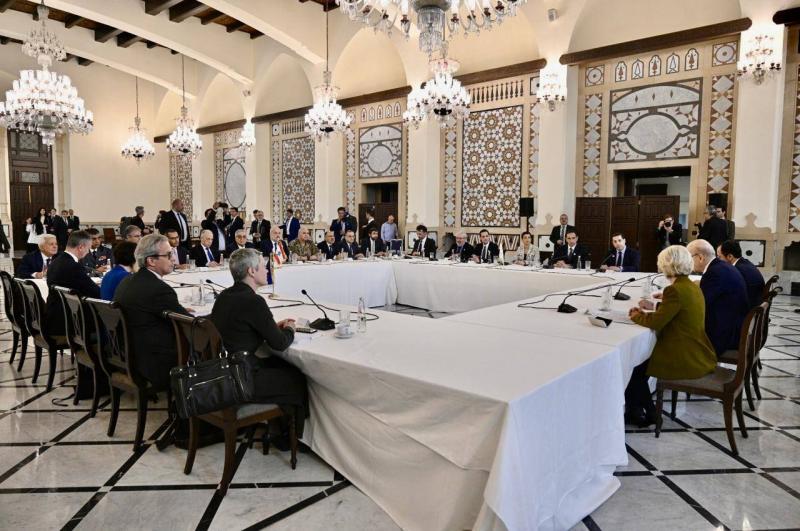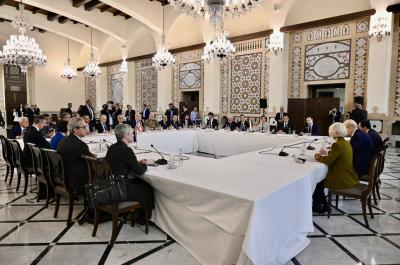Lebanon's Prime Minister Najib Mikati stated in a press conference following discussions with the President of Cyprus, Nikos Christodoulides, and the President of the European Commission, Ursula von der Leyen, that they had a fruitful meeting to review the bilateral relations between Lebanon and EU countries, especially Cyprus, as well as the situation in the region, the tragic events in Gaza, and ongoing Israeli attacks. He reiterated his call for the European Union and the world to exert pressure on Israel to stop its continued aggression against the Palestinian people and work towards establishing a comprehensive and just solution to the Palestinian issue, while also urging the international community to press Israel to cease its aggression against southern Lebanon.
Mikati announced that the majority of the meeting's focus was on the issue of Syrian refugees in Lebanon and cooperation between Lebanon, Cyprus, and EU countries to address this issue and its direct and indirect ramifications. He expressed appreciation for the understanding shown by some EU countries during their recent meeting regarding the Lebanese government's request to reconsider EU policies related to managing the Syrian refugee crisis in Lebanon, a position reflected by the visits of the President and the European Commission's president.
He noted that since the outbreak of conflict in Syria in 2011, Lebanon has borne the brunt of hosting refugees, placing significant pressure on the Lebanese population and all sectors of Lebanese society. Although Lebanon has always aimed to cooperate with various European and international bodies on this issue, the current situation has become beyond Lebanon's capacity to bear, especially as the number of refugees approaches one-third of the Lebanese population, exacerbating Lebanon's economic and financial crisis and straining its infrastructure. This has led to rising tensions between Syrian refugees and some of the host Lebanese communities due to rising crimes threatening the security and stability of Lebanon.
Mikati reminded those present that he has consistently warned in international meetings, particularly with the EU, that the repercussions of the refugee issue would not be confined to Lebanon but would extend to Europe, turning into a regional and international crisis. He is firmly convinced that Lebanon's security is tied to Europe and vice versa. He emphasized that serious and constructive cooperation to resolve this issue could lead to the stability of the situation, with due consideration of mutual respect and fruitful cooperation to preserve Lebanon's unique attributes, which hold significant value for both the East and West.
Mikati rejected the idea of Lebanon becoming an alternative homeland and called on friends in the EU to maintain Lebanon's value and work towards a fundamental and timely resolution of this issue, based on the mutual understanding that the solution is primarily political. He clarified that, in light of the current situation in Syria, the first step needed is for Europe and the international community to acknowledge that many Syrian areas are now safe for the return of refugees, specifically those who entered Lebanon after 2016 for purely economic reasons, and do not qualify as refugees.
He reiterated his call for the EU to support refugees in their home countries to encourage their voluntary return, ensuring they can live with dignity, warning against Lebanon becoming a transit country for refugees moving from Syria to Europe. The issues arising at the Cyprus border exemplify what could happen if this issue is not dealt with fundamentally.
Mikati concluded by expressing Lebanon's appreciation for the EU's new position in supporting the military and security institutions in Lebanon, enabling them to control land and maritime borders and fulfill their responsibilities in preventing illegal immigration from Lebanon and towards it, while also supporting vulnerable Lebanese communities and allocating part of the aid to encourage the voluntary return of Syrian refugees.
In her remarks, Ursula von der Leyen thanked Mikati for welcoming President Christodoulides and herself in Beirut, recognizing Lebanon as a beautiful, diverse, and vibrant country facing significant local challenges due to regional tensions and war. She emphasized that the EU’s strong support for Lebanon and its people remains steadfast, and they aim to explore ways to enhance cooperation, which was made clear to EU leaders at their recent summit.
She announced a financial package worth €1 billion for Lebanon, available from this year until 2027, aimed at contributing to social and economic stability in the country through essential services such as education, social protection, and healthcare. She also emphasized accompanying Lebanon in advancing economic, financial, and banking reforms to improve the overall economic situation in the long term, thereby restoring international confidence in the business environment and banking sector, enabling private sector investment.
Von der Leyen acknowledged that security and stability are also vital for investment and pledged support for the Lebanese Army and security forces, focusing the program on providing equipment and training for border management. She highlighted the importance of establishing arrangements with the European Border and Coast Guard Agency (Frontex) for information exchange and awareness of circumstances. Additionally, the EU is committed to keeping legal pathways open to Europe and resettling refugees from Lebanon to the EU while relying on Lebanon’s cooperation in preventing illegal immigration and combating human smuggling.
Addressing the humanitarian challenges Lebanon faces due to the hosting of Syrian refugees and other displaced individuals, she noted that since 2011, the EU has supported Lebanon with €2.6 billion, not only for Syrian refugees but also for the host communities, and pledged continued support with a focus on enhancing the effectiveness of EU assistance. This includes exploring organized approaches for the voluntary return to Syria in close cooperation with the UN High Commissioner for Refugees while emphasizing the need for increased international support for humanitarian relief and early recovery programs in Syria.
She concluded by underlining the EU’s complete support for efforts to achieve a ceasefire in Gaza and the release of all hostages, along with increased humanitarian assistance to Gaza. Von der Leyen stressed the necessity of a peace process leading to a two-state solution as the only way to achieve lasting peace and stability in the Middle East, stating that the security of both Lebanon and Israel is intertwined, advocating for the full implementation of UN Security Council Resolution 1701.
Cyprus’s President announced a comprehensive support package for Lebanon, including assistance programs for the Lebanese people, combating smuggling, and enhancing the authorities' capacities to monitor borders, reiterating the importance of this step to address shared challenges. He emphasized the EU's commitment to standing by Lebanon and strengthening relations, fully understanding the severe challenges Lebanon faces exacerbated by the long-term Syrian crisis.
Mikati received the President of Cyprus and the President of the European Commission at the Grand Serail, where discussions took place after welcoming the delegation.




